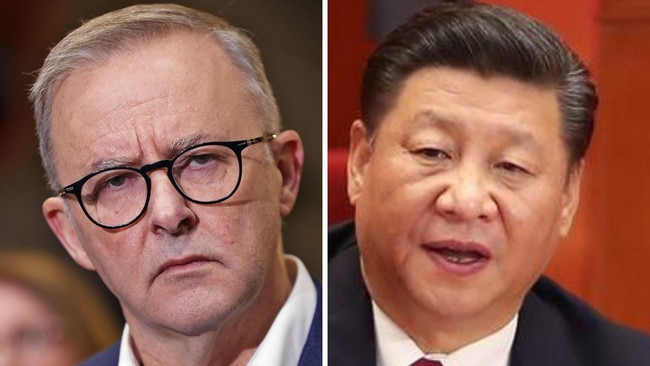What China really wants from Australia in bilateral talks
Australian PM Anthony Albanese and Chinese President Xi Jinping are meeting today. What China wants, Australia will never do.
World
Don't miss out on the headlines from World. Followed categories will be added to My News.
Australian Prime Minister Anthony Albanese and Chinese President Xi Jinping’s breakthrough talks on Tuesday in Bali will go a long way towards re-establishing the type of relationship the two Asia-Pacific powerhouses must have to prosper in the region.
The dialogue will be constructive and cordial. The meeting will act as a reset after relations became strained under the leadership of former PM Scott Morrison.
Trade will be on the agenda – Beijing remains Australia’s largest trading partner. The pandemic might come up given the anger that was caused by Australia’s insistence on an investigation into the origins of the Covid-19 pandemic.
But what China really wants from the relationship will go unsaid. Mr Xi doesn’t need to say it – the official newspaper of the Chinese Communist Party, the Global Times, has already said it.
In an article published on Monday, the government’s mouthpiece suggested Australia must stop “recklessly and blindly following” the United States.
The publication called the relationship between Canberra and Washington “a structural constraint that makes it difficult for Australia to significantly improve its ties with China”.
“Australia will not stop following the US, but the country needs the wisdom to properly deal with its relations with both the US and China,” the Times article reads.
Chen Hong, the president of the Chinese Association of Australian Studies, told the publication that “recklessly and blindly taking sides with Washington would not only undermine China-Australia relations, but also damage its own regional and global interests”.
Australia’s relationship with the US is not the only reason China is harbouring ill will.
A deliberately leaked document last year revealed a list of 14 disputes that were “poisoning bilateral relations” between Australia and China.
“China is angry,” an official said after the leak. “If you make China the enemy, China will be the enemy.”
The list of grievances cited by Chinese officials reportedly included calls for an inquiry into the origins of Covid-19, taking sides over the South China Sea territorial dispute, “thinly veiled” accusations that China is behind cyber attacks and banning Huawei from the rollout of 5G because of security concerns.
An Australian university professor in June hit out at Australia’s handling of China in a scathing editorial published in the Global Times.
Sinologist and Emeritus Professor at Griffith University, Colin Patrick Mackerras, blamed “unnecessarily abrasive” diplomacy from former prime minister Scott Morrison and former foreign minister Marise Payne.
Stream more world news live & on demand with Flash. 25+ news channels in 1 place. New to Flash? Try 1 month free. Offer available for a limited time only >

He also said there were signs the relationship between Canberra and Beijing, which are at an all-time low, will not improve under Anthony Albanese’s government because “Labor policy is similar in many ways to that of Morrison and his (former) government”.
“Australia-China relations were very good indeed for decades,” said the expert in Chinese culture.
“After the establishment of diplomatic relations under the Whitlam government in 1972, cultural, educational and other exchanges blossomed, trade grew until China became Australia’s top trading partner and leaders visited each other’s country and carried on successful diplomacy.
“It seems to me that the relationship reached a high point in 2014 when President Xi Jinping visited Australia and the relationship was declared to be one of comprehensive strategic partnership, with the China-Australia Free Trade Agreement reached the following year.
“Since about that time, a variety of factors has caused the relationship to deteriorate. Many of these, though by no means all, result from Australia’s excessive dependence on the US.
“I would add that (former) prime minister Scott Morrison and foreign minister Marise Payne were not good diplomats. Morrison was excessively and unnecessarily abrasive in his dealings with China.
“The signing of the Australia-United Kingdom-United States agreement, under which Australia broke a contract for arms purchase with France and promised instead to buy nuclear-powered submarines from the US and UK, threw Australia back into an earlier and one hoped bygone era of excessive and to some extent exclusive military engagement with the Anglosphere.”
On Monday, Mr Albanese told media the two countries were entering discussions “with goodwill”.
“There are no preconditions on this discussion,” he said. “I am looking forward to having constructive dialogue. Australia will put forward our own position.
“I look forward to having a constructive discussion.
“I have said since I have become Prime Minister, but before then as well, that dialogue is always a good thing. We need to talk in order to develop mutual understanding.”
It comes as US President Joe Biden and his Chinese counterpart met in person on Monday in Bali – the first time they have done so since Mr Biden took office at the start of 2021.
Originally published as What China really wants from Australia in bilateral talks





